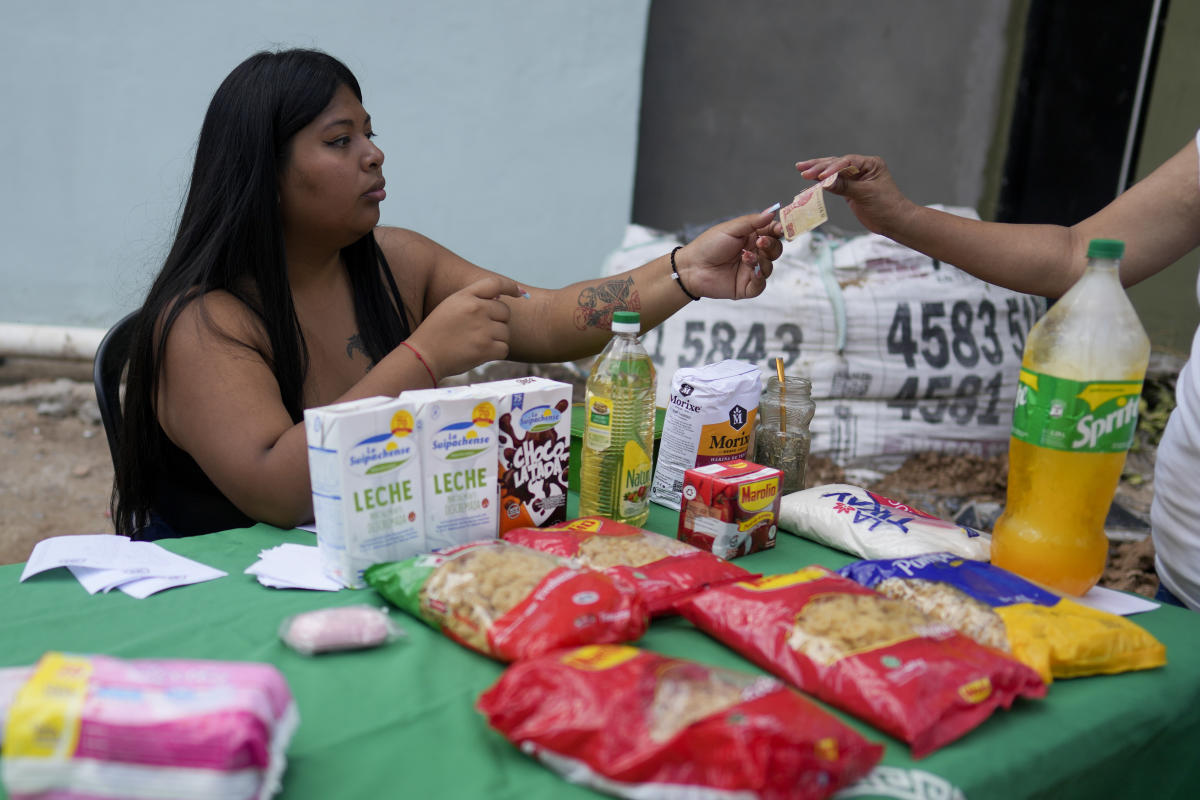BUENOS AIRES, Argentina (AP) — Every weekend, Jesica Fernández joined seven family members for a big beef barbecue. Beef is no longer on the menu and now they prefer spaghetti or chicken wings.
In beef-loving Argentina, barbecues now only take place on birthdays or special occasions, Fernández said.
Fernández, 31, is one of millions of Argentines struggling to make ends meet.
She was shopping at a market sponsored by the municipality of Lomas de Zamora, some 25 kilometers (15 miles) from the capital, where businesses offer basic goods at lower prices in exchange for the free retail space.
“We buy less beef and we buy less stuff. In reality, you can’t give yourself the luxuries you could before,” Fernández said,
The country’s statistics agency Indec said this week that consumer prices rose 6.6% in February from the previous month, a higher number than expected, on top of years of double-digit annual inflation over the past decade. Food was one of the items that rose the most in February, rising 9.8% from January, due in part to a punishing drought that has driven up prices of meat and other commodities.
“The situation is very difficult and is getting worse every day,” said Daisy Choque Guevara, 42.
Mabel Espinosa, 37, was walking the market with her 10-day-old baby, Gael, hoping to find deals to buy enough food for herself, her husband and six children.
“The money isn’t enough for anything,” Espinosa said. “Barbecues? Forget it.”
President Alberto Fernández is struggling to contain the country’s rising inflation, which will no doubt be a key issue in the presidential campaign leading up to October’s election.
Argentines have long experienced major bouts of rising prices, worse than elsewhere, due to the government’s tendency to print money to fund spending. That trend accelerated during the COVID-19 pandemic, while a sharp depreciation of the local currency also pushed up prices.
The center-left government of President Alberto Fernández has tried to rein in rising prices through price controls that have largely failed. Much of the opposition says Argentina needs a broader stabilization plan, including a sharp cut in spending.
“We clearly think the inflation data is bad, really bad, plus it was unexpected,” presidential spokeswoman Gabriela Cerruti said Thursday. “The government remains committed to controlling prices, controlling inflation, reducing inflation and not allowing prices to continue to rise.”
However, Espinosa is not convinced that things will improve, at least in the short term.
“I call it resignation, nothing changes… Why get angry?” she said. “Today you get something for one price and tomorrow it’s another price, but it doesn’t matter, you have to pay for it because you need it.”
People should cut back where they can.
“For example, if I could buy two yogurts before, now I can only buy one,” says Roxana Cabrera, 38. “It’s very difficult to buy now, you have to look for prices.”
Anything that is not absolutely necessary is left to a later date.
“For example, I used to be able to buy clothes, but not anymore,” said Cabrera. “Now I can only buy food.”
For some, the choices are even more drastic.
“We don’t eat,” says Yanet Nazario, who lives with three of her children and seven grandchildren in a run-down neighborhood in Buenos Aires. She bought flour and soap from a makeshift stall set up by a co-op in her neighborhood that sells a few basic goods at lower prices than the stores.
“There is a lot of sacrifice now because the money you earn is not enough, you have to work a lot more, we have to go to soup kitchens,” Nazario said.
The children in the household are fed by soup kitchens that now limit their food to young people only because the overall demand has become so great.
“We adults just drink a cup of tea” before dinner, Nazario said. “The next day we skip breakfast and go for lunch.”

